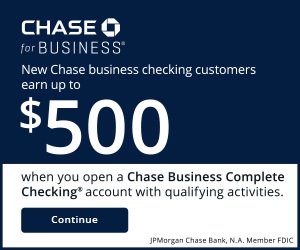
Contrary to what some might think, corporate and business credit card are actually two different things. Corporate credit cards are typically issued to businesses with revenues of several million to billions of dollars, and the company, not the employee, is liable for any problems.
On the other hand, business credit card are applicable to companies of all sizes, from family run businesses to large multi million dollar businesses. If you’re an entrepreneur or a small business owner, then a business credit card is perfect for you.
Before you apply for any credit card though, you should do your research and check out the details, fees, and pros and cons of cons of each corporate and business card to help decide the best one for your needs.
| PROMOTIONAL LINK | OFFER | REVIEW |
| U.S. Bank Platinum Business Checking Package | $1200 Cash | Review |
| U.S. Bank Business Essentials | $900 Cash | Review |
| Huntington Bank Unlimited Plus Business Checking | $1,000 Cash | Review |
| Huntington Bank Unlimited Business Checking | $400 Cash | Review |
| Axos Bank Basic Business Checking | $200 Cash | Review |
| Regions Bank Business Checking | $150 Cash | Review |
| NorthOne Business Checking | $20 Credit | Review |
| Novo Business Checking | $75 Cash | Review |
What Is a Corporate Credit Card?
As mentioned, a corporate credit card is designed for very large, multi million dollar companies. Unlike business cards, corporate credit cards do not require a personal guarantor.
To get a corporate credit card, a company must turn over their tax ID and corporate financial record to the credit card issuer for review. Additionally, the company will remain responsible for any failure to pay its credit card obligations.
When You Should Use a Corporate Credit Card
It is best to use a corporate card when there is a major company that has hundreds of employees. Using a corporate card can help make the process of monitoring employee expenses much easier. Additionally, it will help the company track employee business, travel and petty cash expenses.
When employees use corporate cards, the company categorizes and analyzes expenses — the employees only need to turn in the original receipts and avoid charging personal expenses on the company card.
Pros and Cons of Using a Corporate Credit Card
Although we’ve stated that a corporate credit card is great for large businesses, it is still important to know the pros and cons of having these types of cards.
Pros
- Using corporate credit cards improves reporting and record-keeping.
- Employees streamline paying for business expenses.
A dedicated customer service representative is typically a benefit of a corporate card. - Corporate credit cards might come with special benefits like travel and emergency assistance services.
- Corporations can better monitor and analyze employee spending.
Cons
- Employees lose the opportunity for rewards, miles and other benefits that might accrue when they use their own cards.
- Corporations must ensure employees do not use the card for personal expenses.
- Card costs and fees might outweigh benefits.
- Some lenders run credit checks on employees who receive corporate credit cards.
Corporate Credit Card Fees and Costs
Corporate credit card fees, charges and interest rates vary by provider and type of card. In general, the spending cap per card is flexible and you can set that up with the card provider.
By doing your research on different credit card companies, you can find that they can offer some great deals such as different billing cycles, a lower member fee, a grace period and more.
What Is a Business Credit Card?
Nowadays, a large number of credit card companies offer some type of business credit card, which are some of the best credit card for small businesses. To describe small, a business card will be good for a smaller S corporation, LLC or partnership.
Business credit cards can be used just like a normal credit card. Making purchases for your business can help it build a credit history. However, a key difference between a business credit card and a corporate credit card is liability for late payments. For business credit cards, a designated person is responsible for making payments on the card.
You can view the latest business credit cards from Chase, American Express, Citibank, Wells Fargo, Capital One, and more!
When You Should Use a Business Credit Card
Small businesses and medium-sized companies could benefit by using a business credit card for making purchases. Businesses owners should try to only use the business credit card for their company. With this method, the business can separate business and personal expenses. Also, because owning a small business can be risky, people should try to avoid risking their own personal credit on business expenses.
Pros and Cons of Using a Business Credit Card
Although using a business credit card can be advantageous for small businesses, it is important to keep in mind certain things. Here are some pros and cons of using a business credit card.
Pros
- It will likely offer a higher spending limit than a personal credit card.
- Because of the variety of providers and types of cards, low- or no-fee cards might be available.
- Business owners and employees can buy work-related items and pay off the balance over time.
- The card can help the business develop a strong credit profile, which might help with future capital funding needs.
- It provides spending reports, which can improve record-keeping.
Cons
- Employers must monitor the card for fraud and misuse.
- It might be subject to a higher annual percentage rate than a personal credit card due to additional perks and benefits.
Business Credit Cards Fees and Costs
Just like their corporate card counterparts, business credit card come with their own fees and costs. Applying for a business credit card doesn’t require any financial documents, and you can normally complete the application in as little as five minutes. The interest rate associated with the card will vary based upon market conditions.
Business Accounts to Consider
 • Open a Huntington Unlimited Plus Business Checking Account • Earn $1,000 bonus when you open a Huntington Unlimited Plus Business Checking account and make total deposits of at least $20,000 within 30 days of account opening. • Maintain minimum daily balance of $20,000 for 60 days after meeting deposit requirement. • The $1,000 bonus will be deposited into your account after all requirements are met. • Enjoy overdraft protection with no annual fee or deposit-to-deposit overdraft protection with no transfer fee! • Bonus Service. Choose one bonus service such as fraud tools, discounts on payroll services, or Huntington Deposit Scan® • Ideal for businesses with higher checking activity and greater cash flow needs. |
 • Open a Huntington Unlimited Business Checking Account • Earn $400 bonus when you open a Huntington Unlimited Business Checking account and make total deposits of at least $5,000 within 60 days of account opening. • The $400 bonus will be deposited into your account after all requirements are met. • Get Overdraft Protection Account with no annual fee, or Deposit-to-Deposit Overdraft Protection with no transfer fee. • Enjoy unlimited transactions. And up to $10,000 in cash or currency deposits monthly in-branch or at an ATM at no charge. • Designed for businesses with higher checking activity and greater cash flow needs. • Bonus service. Choose one bonus service such as fraud tools, discounts on payroll services, or Huntington Deposit Scan®. |
 |
 |
 |
 |
Bottom Line
Unless you’re an employee of a major company, then a small business credit card is the most flexible and affordable option for you. On the other hand corporate cards tend to be more expensive but offers a way to track employee expenses.
The way to find the credit card that suits your needs is to compare multiple and see which ones works for you and your business.
If you own a business or planning on starting your business, check out our list of the latest business account promotions(or personal accounts) and business credit cards to find the best account suited for you and your business.
For more posts like this, check out our list of credit card bonuses and bank guides!





Leave a Reply